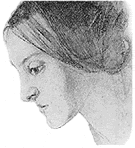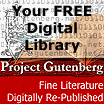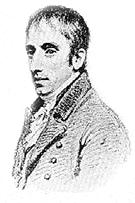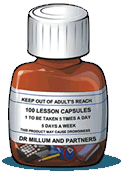Literature links and resources
This page lists some useful materials for teaching literature. There are separate pages for several authors, books for A Level and for teachers as well as some other resources. See the menus on the left: move your mouse over the links with an 'expand' symbol to see more links.
Finding texts online
You can find most non-copyright texts on the Internet though you may need to try more than one library. Project Gutenberg is probably the best place to start. Using a good search engine can sometimes make this quicker - and may also enable you to find some modern works as well.- Alex Catalogue of Electronic Texts: works by 129 authors
- Project Bartleby
- Electronic Text Centre - University of Virginia
- Great Books Online
- The Internet Public Library: an easy to use online library - try the IPL's Shakespeare Bookshelf for the plays.
- Literature resources from MIT
- Online Books Page at the University of Pennsylvania
- Oxford Text Archive: an archive for the 'worldwide academic community', aiming to provide accurate digital editions. Access is free though you may be asked for your email address before you download.
- Poetry Archives from emule.com: easily searched database of thousands of classic poems.
- Project Gutenberg: a very comprehensive source of free texts. Plain text files are the most useful, though a compressed ('zip') file is quicker to download if you have a slow connection. Then extract the contents either by using the unzip facility in Windows or a free utility such as 7-Zip.
- Project Gutenberg Australia: an alternative text site which has a number of more recent works that you won't find on the main Gutenberg site.
- Representative Poetry Online: over 2,900 poems by more than 400 poets, carefully edited, from the University of Toronto.
- A Medieval Sourcebook
Literature resources and teaching materials
- The Blake Archive: wonderful pictures! See the separate Blake page for more links.
- British Council Contemporary Writers site - useful profiles of some of the UK and Commonwealth's most important living writers - biographies, bibliographies, critical reviews, prizes and photographs. There are also audio and flash files in the Poetry Quartets section - see below.
- Steve Brown - a teacher's own site
- Converse: a literature website from Cambridge University for Key Stage 3 upwards.
- English Online has some free resources, including the invaluable Collapser tool that allows you to turn any piece of text into a list sorted in a variety of ways, a list of sites for the National Curriculum authors and revision notes on some A Level texts.
- Internet Public Library literary criticism page: links to 'critical and biographical websites about authors and their works'; requires some research but teachers may find useful material here.
- Literary Resources on the Net from Jack Lynch of Rutgers University - useful links, mostly suitable for teachers rather than students.
- Luminarium: materials on Medieval, Renaissance and Seventeenth Century English literature, including texts and audio recordings, all attractively presented.
- Oxford University First World War site - see also the First World War page on this site.
- Proquest Learning: a subscription site that is worth investigating for the wealth of background material.
- Screenonline: this resource from the British Film Institute provides excellent free moving image resources. Free, but access restricted to schools and colleges.
- Teachit: a vast horde of free and subscription resources, from primary to A Level. "Over 5000 pages of materials - from Austen to Zephaniah."
- Universal teacher: Andrew Moore's site - the section on the AQA GCSE English Anthology is just one of many useful sections.
- The Victorian Web: a rich source of materials and links, especially for advanced students and teachers.
- Voice of the the Shuttle - a site which 'models the way the humanities are organized for research and teaching as well as the way they are adapting to social, cultural, and technological changes'.
Literary terms
These glossaries provide valuable quick reference. If you need more detail and examples, I'd suggest you turn to a book like M H Abrams' classic A Glossary of Literary Terms- Cambridge University Virtual Classroom Glossary of Literary Terms
- Glossary of Literary and Rhetorical Terms from Jack Lynch of Rutgers University, though 'I'm still working on putting it together, and there are gaps aplenty'.
- Literary Terms from Cyber English by Ted Nellen, cybrarian.
- Silva Rhetoricæ or The Forest of Rhetoric: a guide to the terms of classical and renaissance rhetoric. 'Sometimes,' says the site, 'it is difficult to see the forest (the big picture) of rhetoric because of the trees (the hundreds of Greek and Latin terms naming figures of speech, etc.) within rhetoric.' Useful for more obscure terms.
It is a test... that genuine poetry can communicate before it is understood
T S Eliot: from 'Dante' (1929)
T S Eliot: from 'Dante' (1929)
Poetry resources
In addition to the sites listed above, these sites have resources specifically for poetry. See also the poetry page.- Are you sitting comfortably? Contemporary nursery rhymes from leading poets commissioned by The Guardian in September 2005.
- Blake: see the separate page devoted to William Blake.
- British Council Poetry Quartets online: over two hours of audio extracts from the British Council/Bloodaxe poetry recordings. There are lively flash movies to accompany some of the poems
- The Mouse and the Muse: ideas for poetry and ICT from Trevor Millum including downloadable poems and ideas on using a word processor creatively. You can order a copy of Trevor's Warning: Too much schooling can damage your health from the NATE bookshop.
- Oxford University First World War site includes seminars on First World War poetry, including access to Owen's manuscripts, contemporary photographs, etc. See also the First World War page on this site.
- The Poetry Archive: "well on its way to becoming the world's largest and best equipped collection of poets reading their own work," says Andrew Motion, one of the prime movers behind the site. Includes priceless archive readings from poets of the past such as Tennyson, Sassoon, Larkin and Yeats, classroom favourites such as Armitage and Causley, and lesson plans too.
- Poetic form from Wikipedia, the free encyclopedia: a useful list, with examples, of over 130 terms.
- Poetry Book Society: devoted to encouraging the appreciation of poetry - with a book club and useful links to poets' sites.
- Poetryclass: lively ideas for teaching modern poetry from the Poetry Society, with links, interviews with poets, etc.
- Poetryexpress: an American site that allows users to experiment with poetry. The emuse poetry generator works well with an interactive whiteboard.
- The Poetry Trust: runs the Aldeburgh Poetry Festival and a number of other events in East Anglia, including popular courses for teachers.
- Poets.org from the Academy of American Poets: attractive site which features new poets each month and is a useful source of work by modern poets. There's a section 'for educators', with topics such as Great Poems to Teach.
- Sheerpoetry: 'an innovative and constantly changing new UK poetry site'. Sections for teachers and students from primary to university level as well as the general poetry reader. The content has a special emphasis on Carol Ann Duffy, Gillian Clarke, Seamus Heaney and Simon Armitage but classic poets are not neglected. Modest subscription required.
- tXt café: text message poetry site from Norman Silver - inventive, witty and highly attractive. Try the noisy txter8r (in the Specials area) to 'gener8 nu words'!
- Unlocking Literature: A CD-ROM for GCSE poetry by Trevor Millum and Chris Warren from NATE - you can see a sample online here.
Publish online
These sites give students the chance to publish their own poetry or other writing:- Stories from the web: Stories, reviews, poems and competitions on this lovely site run by Birmingham Libraries.
- Kids' Space: a site is for under 16s to send in stories and pictures. There is a good section on folk tales from around the world.
- Kidscom: this site is a riot of activities and includes a section on writing.
- Creative writing for teens: a site for older students which has a huge range of categories for writing as well as writing tips and activities.
- Kids Bookshelf: young writers can submit reviews, stories and poems.
Resources for A Level English Literature
- The Cross Reference Project (Crossref-it.info) has cultural contexts, detailed studies of topics and some popular texts and more. Now free, it's a good place to check contextual aspects such as classical and Biblical references.
- English and Media Centre: includes the excellent e-magazine for students, publications (such as Text, Reader, Critic) and courses.
- Headstrong CDs: The English Romantic Poets and Over the Nightmare Ground: British Poetry from two World Wars are both worth investigating. They can be obtained from Headstrong or the NATE bookshop.
Shakespeare
See the page dedicated to Shakespeare for detailed links to resources
Comics and graphic novels
Comics and graphic novels not only give great pleasure (who has not enjoyed them as child, parent or just reader?), they can be works of literature in their own right.- Dr Mel Comics: an excellent introduction to the use of comics in schools and libraries with comprehensive links. One of these is to the site Mel created for teachers:
- Graphic novels in the curriculum from Learning and Teaching Scotland
Reference
As well as Shakespeare - see above - Desert Island Discs always assumes castaways will want the Bible and an encyclopaedia. These are especially important resources for literary study, so here are some online versions:- BibleGateway is a good source of online translations of the Bible. Nowadays you'd probably want to read a reliable modern translation such as the New International Version; remember, however, that until the end of the Nineteenth Century most English readers would have known only the Authorised Version (so called because it was 'authorised to be read in churches' in Britain - Americans call it the King James Version). This was published in 1611, so writers such as Shakespeare would have known earlier versions such as that by Tyndale (first published in 1526) - the translators James I employed often drew on Tyndale's turn of phrase.
- Bible Research will tell you more about the Bible, and in particular about translators such as Tyndale. There's a very moving poem about Tyndale called 'Tyndale in Darkness' in U A Fanthorpe's excellent volume Safe as Houses
.
- Wikipedia is a free online encyclopedia that's a good place to begin research. Anyone can contribute and edit articles, which means information can change frequently and is, in theory, subject to the bias of the writer. But as that's true of any publication, once you (and your students) are aware of this, you'll find it invaluable.
For more about Wikpedia, see these Guardian articles published on 8 December 2005: In praise of... the Wikipedia and Wikipedia bans anonymous contributors.
Art on the Web
A picture may or may not be worth a thousand words, but pictures - and some appreciation of the visual context of the period - can be invaluable when studying literature. Blake is a case in point - worth a page of his own.
Finding images online
- AltaVista image search: this has a very useful 'family filter', which you can switch on or off. If the filter is on then it attempts to avoid images whose content might be questionable.
- Fagan Finder: Michael Fagan's useful collection of image search engines, including many specialised ones.
- Google image search: Google offers a powerful image search facility. The 'SafeSearch filter' operates in a similar way to AltaVista's family filter.
- Yahoo also has an image search facility: click on 'Images' on the row of buttons at the top of the page. The 'SafeSearch filter' is very similar to Google's.
Online galleries
Many of museums listed in the next section allow you to view at least some of their collections - and some have excellent educational material. In addtion, this is a valuable resource:- Web Gallery of Art: a virtual museum and searchable database of European painting and sculpture of the Gothic, Renaissance, Baroque, Neoclassicism and Romanticism periods (1100-1850)
Galleries and museums
- 24 Hour Museum: For information on museums and galleries all over the UK. Popular ones include:
- British Library - see especially Turning the Pages and the Learning section for resources such as Texts in Context ('From recipes to adverts, letters to logbooks')
- British Museum
- National Gallery
- National Portrait Gallery
- Tate Online
Art history
- Art history resources on the Web from Christopher Witcombe of Sweet Briar College, Virginia.
Costumes
- The Costumer's Manifesto: the section on Costume History sorted by Period is particularly valuable. Don't be put off by the basic appearance of the contents page - there are many illustrations once you explore the links.
The examination boards
- See the complete list on the Teaching Resources page
- See also the pages here for AQA English Literature Specification A.
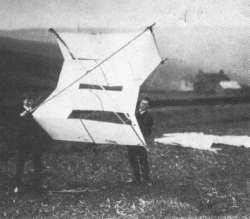
Wittgenstein flying a kite above Glossop
at Manchester University's Upper Atmosphere
Station in 1908
Local literary links
Wherever you are there are bound to be local literary connections. Seek them out - they can add interest to your teaching and reading. Here are some for where I live:- Derbyshire's Literary Connections from Derbyshire UK: Izaak Walton to the Sitwells, not forgetting Jane Austen.
- Ludwig Wittgenstein - who stayed above Glossop in his kite flying days, before he became a famous philosopher; more about this on the Blog
- Hilary Mantel, born in nearby Hadfield; find Hilary Mantel's books here.
